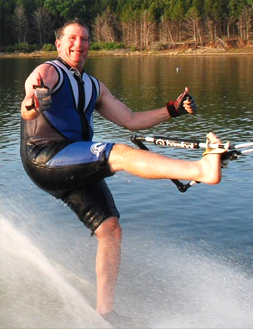By Jessica Huseman
Mark Shank must be an adrenaline junky.
A fast-paced attorney specializing in commercial and employment law who also happens to be special counsel for Texas Congressman Pete Sessions should be drained by the end of the day, but he still finds time to barefoot waterski.
“[Barefoot waterskiing] is basically what it sounds like,” said Shank, who is 58 and a partner at Gruber Hurst Johansen Hail Shank in Dallas. “You start out on your back, then sit up and ride on your tailbone, and then, when the speed gets up to 35 miles-per-hour or so, you stand up.”

Shank has been doing this since he was a kid growing up near the Lake of the Ozarks. He learned through trial and error and by talking to the performers at local ski shows, and meticulously honed his skills enough to be in shows himself, eventually performing two shows a day, seven days a week.
“I did that for a while in college and law school, and learned to jump, trick, carry girls in doubles acts, did clown acts, and announced,” he said. “I become the only guy there who could step off a ski backwards onto my bare feet. It was a great summer job.”
Shank moved to Dallas in 1980 after law school, and quit skiing on any serious basis – though he admits he enjoyed showing off at weekend parties.
He and his wife eventually bought a cabin at Lake Texoma, which allowed Shank to get back into barefoot skiing.
“In the last four or five years I have become more serious about it, and have met and skied with some of the best barefoot skiers in the world,” he said. “And believe it or not, I’m am improving — learning new tricks — each year.”
So much, in fact, Shank will be competing this year in the Southern Regional Barefoot Tournament. It will be the first competition he’s ever done as he’s only performed in shows in the past, and he says he’ll likely be the oldest competitor there.
“I am not likely to place. But at my age, just the fact I can compete with people less than half my age is a thrill,” he said.
Shank’s favorite tricks, which he plans to perform at the competition, are the backward deep-water start and the toehold.
For the first, Shank sits on the rope while in the water. When the rope tightens, he hooks his foot on the rope and rolls face down, pointing his feet toward the boat. As the boat speeds up, Shank plants his feet in the water, sticks his butt up in the air, and then stands up backwards.
The toehold is a little easier to picture.
“While skiing forward, you pick up one foot and put it in a special harness in the rope. Then remove your hands,” Shank said. “Looks Ma, no hands!”
Shank said he’s stuck with the unique sport so long because it satisfies his need for speed.
“You ski between 34-43 mph, depending on the trick. It is exhilarating and exciting. And you have to give it your full concentration,” he said. “If you lose concentration you are likely to take a very hard fall.”
He’s even taught his children the sport, though he says none of them are as serious about it as he is.
Shank, who earned an LL.M from SMU Dedman Law School in 1984, said skiing has taught him a lot about life, and how to interact with all types of people.
“It’s taught me the patience associated with teaching a new skill on the water, and tenacity — it takes a lot of it to learn a new barefoot trick. And the value of staying in shape and having work-life balance,” he said.
And, since he’s currently the board chair for Habitat for Humanity in addition to his waterskiing hobby and his busy life as an attorney, that last skill is something he needs a lot of.
“[Skiing] provides a nice and fairly complete release from the stresses of the day,” he said.
PLEASE NOTE: Content of The Texas Lawbook is controlled and protected by specific licensing agreements with our subscribers and under federal copyright laws. Any distribution of this content without the consent of The Texas Lawbook is prohibited.

Leave a Reply
You must be logged in to post a comment.